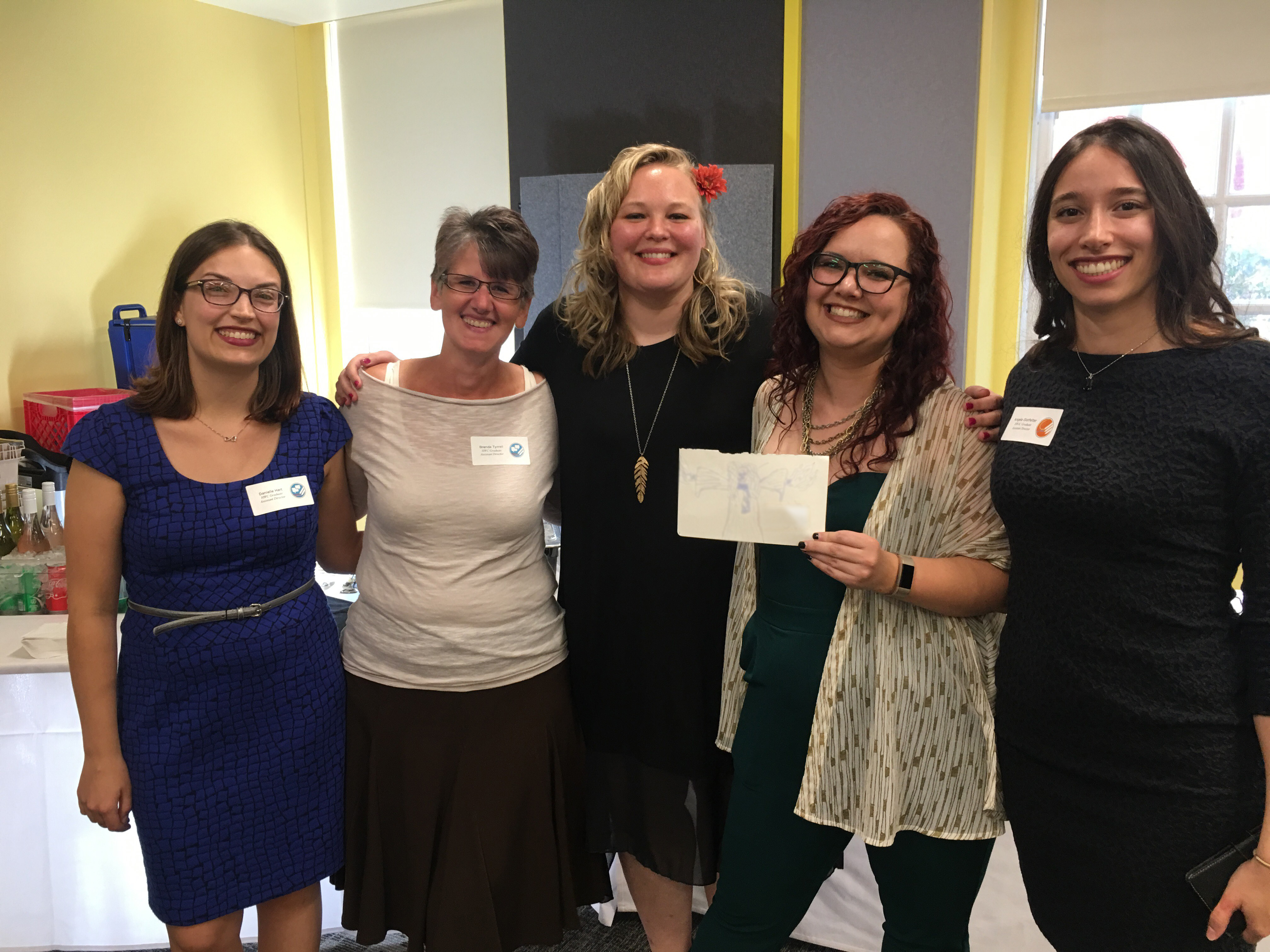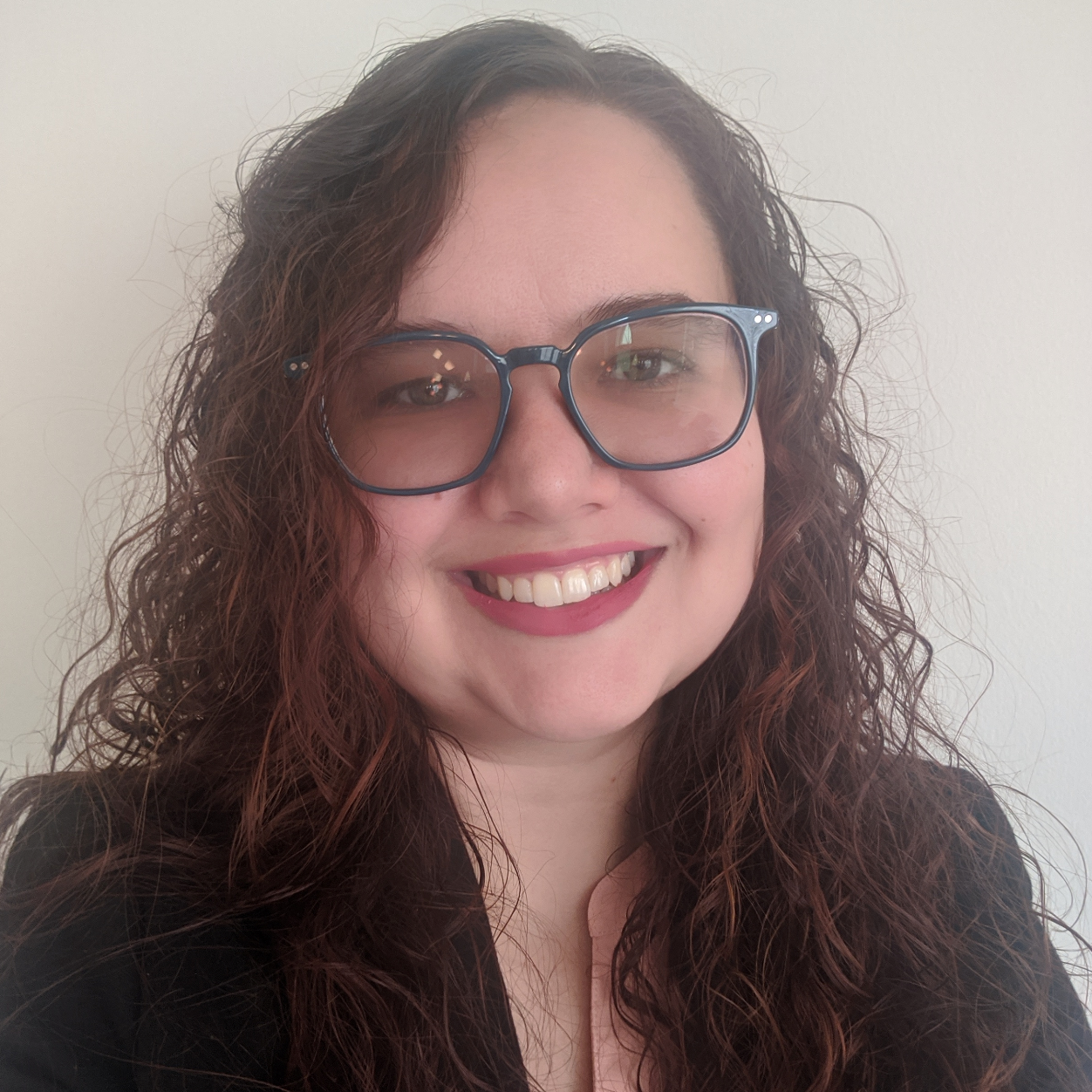Dr. Caitlin Martin Reflects on Her Time at the Howe

By Chris Murphy
These days, if you join Dr. Caitlin Martin in a Zoom meeting you’re likely to find her multitasking. She’ll pay close attention to whatever workshop or presentation or discussion is going on, but at the same time she’ll be methodically crafting away with two long knitting needles. When Martin met me, virtually, to reflect on her upcoming graduation from Miami and her new job as an assistant professor at Embry-Riddle Aeronautical University in Daytona Beach, Florida, those needles kept jutting into her frame, as if themselves curious of what she had to say.
There’s something rather apt about knitting being Martin’s main hobby. About her ability to understand a cardigan or a shawl for each of its interlaced threads. As a scholar, Martin operates much the same way. She’s driven to make change in her field of Writing Across the Curriculum (WAC). She appreciates, however, that change is inseparable from the exacting work in research and assessment that creates it.
For her dissertation, chaired by Elizabeth Wardle, Martin investigated the role of professional development programs–like those she’s led here at the Howe Center for Writing Excellence (HCWE)–in enacting institutional-wide change at 3 colleges: a large “flagship” university, a liberal arts college, and a small, Hispanic-serving institution (HSI). She wanted to find out how program leaders support faculty as they think about how writing is taught and learned, and how those ideas can result in redesigned curricula, new student learning outcomes and assessments, or innovative pedagogical practices. Central to Martin’s inquiry was cultural historical activity theory, which posits that any system we work within is inherently bound up in rules and traditions developed throughout that system’s history. In the case of universities, it’s quite a long history indeed. Systemic change in WAC, therefore, can only come with an intimate understanding of the history of WAC systems.
In late March, Martin defended her dissertation, “Facilitating Institutional Change Through Writing-Related Faculty Development,” before her committee of Wardle, Jason Palmeri, Elizabeth Hutton, John Tassoni, and Thomas Poetter. Also observing were Martin’s mother, Diana, a longtime K-12 educator in the Indiana public school system, and her father, Tom, a retired mail carrier. Martin spoke expertly on the gaps that currently exist between theories of change and practice in WAC. She demonstrated how faculty training programs that focus on individual teachers can yield limited reach and, thus, limited return. Martin advocates for more team-oriented models, where groups of faculty collaborate on solutions to a shared curricular problem.
When told that she passed her defense, Martin donned a handmade crown adorned with white paper flowers and topped by an angel between whose wings arched the phrase “Holy Crap.” The crown, a gift from Wardle, was a perfect send off for Martin, a master of crafting who’s also well-known for her uncanny ability to combine professionalism with her outgoing personality. Her networking at conferences, for instance, is the stuff of legends. By her friends’ accounts, Martin has yet to come across a preeminent scholar in the field she couldn’t approach cold and soon engage in a substantive, and friendly, conversation.

Caitlin Martin’s dissertation defense was a celebration of her exceptional scholarship on matters of leading change in Writing Across the Curriculum initiatives (Martin in bottom frame).
Martin now finds herself living a post-dissertation life that’s in turns “surreal” and “weird.” Certainly, the defense marked an endpoint of sorts. It was the culmination of 5 years spent studying, researching, teaching, and working at the Howe Writing Initiative (now the Howe Center for Business Writing) and the HCWE. But Martin also recognizes that the Miami chapter of her life will constantly source new beginnings. She can return to it to inspire future scholarly work, inform her professional practices, and remember the close-knit community of faculty and student writers she came to know so well.
Perhaps this lasting impact Miami has made on Martin, and vice-versa, can be best illustrated by a story she shares about attending an HCWE workshop the week following her dissertation defense. Martin regularly drops in to HCWE events and has hosted plenty of her own, but this particular workshop, focused on “Collaborative Writing During Covid,” was of special interest to her. That’s because Gaile Pohlhaus, Keith Fennen, and Elaine Miller were leading it. These philosophy faculty comprised one of the first teams Martin worked with as a Graduate Assistant Director co-coordinating the Faculty Writing Fellows program. Also, one of Martin’s many bylines in the Miami Writing Spotlight Series featured the philosophy team’s efforts in making expectations of philosophy writing “visible” to their students. The team-based faculty development Martin argues for in her dissertation—Pohlhaus, Fennen, and Miller are exemplars of it.
As Martin listened to the philosophy team share how they embraced the social nature of writing by finding ways to write together virtually during the pandemic and, later on in the session, respond artfully to audience questions about threshold concepts and writing genres, she says she became emotional. Fond memories of working with the team from the summer of 2017, when they were Fellows, and then on through the years surfaced. The full-circle feeling of the moment was only enhanced by the fact that Pohlhaus, Fennen, and Miller had made an indelible impact on her dissertation. Martin learned from them to research like a philosopher and read “genealogically,” looking for links between scholarship over time. It was her own threshold concept, one that completely changed how Martin approached reading for her dissertation. She began to process sources in chronological order, keeping detailed citations and tracing connections that could help her understand the material better and identify new, intricate patterns of scholarship.
It feels bittersweet to be leaving Miami, Martin says. She’s excited for what’s ahead at Embry-Riddle, where she’ll join the Humanities & Communication Department as an assistant professor. She’s entering what she refers to as a “liminal space,” which is something she’s become accustomed to in her research and administrative work. There’s WAC-oriented change planned on campus, but for now Martin expects to mainly teach first-year writing and take advantage of the opportunity to better understand the school’s writing culture. Martin jokes that this may also be a perfect time to try to get a pilot’s license, since she’ll be teaching at an aeronautics university. She’ll certainly miss Miami and her friends in Oxford a great deal, though, and regrets that the past year of pandemic has kept her out of the HCWE. That office, her academic home for 3 years, was indispensable. She did so much thinking there. And researching. And writing. And high-impact administration like leading Fellows and workshops and curating massive amounts of Center data for a recent 5-year Program Review.
Martin’s old desk is second in row of three arranged adjacent to another row of two in the southeast corner of the HCWE. In non-pandemic times, these desks were populated with Howe Graduate Assistant Directors. Close friends and scholars whose work often complemented each others’, the group would do everything from hitting the Farmers Market or the Phillips gym together to hosting potlucks for reading, writing, and grading sessions. A sign Martin kept at her desk sums up their dynamic: “We’re not friends,” the sign read. “We’re more like a really small gang.”

Howe Graduate Assistant Directors at the 2019 National Advisory Board meeting (Martin second from left).
When the HCWE team returns to the office again we’ll find Caitlin’s desk empty. That will be sad, as such things are, but we’ll carry with us Martin’s enduring knitwork. The invisible string connecting our staff, faculty across disciplines at Miami, and yes, extending all the way to Daytona Beach, where it will perhaps join Caitlin in the cockpit of a plane floating tentatively over the central Florida swamplands, or, more likely, in a well-run and change-driven classroom, with students as grateful to learn from her as we’ve been.

Dr. Caitlin Martin is a PhD graduate of Miami University’s Class of 2021. This Fall, she’ll join the Humanities & Communication Department at Embry-Riddle Aeronautical University as an assistant professor. Follow her on Twitter (@cookingandcomp) for, as the handle implies, all things cooking and composition studies.

